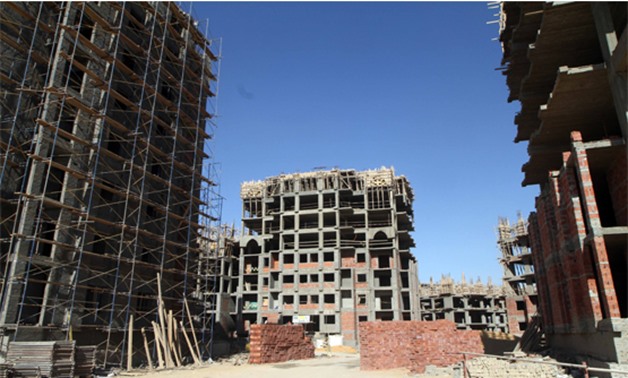
Building under contraction - File photo
CAIRO – 2 June 2017: In contrast to expectations of a weak real estate market following the flotation of Egyptian pound in November, due to higher costs of land, construction activity and production input operating companies showed strong performance in the first quarter of 2017.
Real estate developers in Egypt were anticipated to overcome these high charges through increasing the prices of homes, international real estate consultancy Jones Lang LaSalle (JLL) said in their 2016 outlook.
In JLL’s Q1 2017 report, however, the outlook was more positive on the efforts made by real estate developers to shake up the market through introducing efficient payment plans and minimizing the sizes of units.
The optimistic stance was reflected in Q1 results of key real estate players, most prominently Madinet Nasr for Housing and Development (MNHD), whose profits jumped approximately 500 percent year-on-year in that period to record LE 407.2 million ($22.6 million).
On the revenue side, MNHD’s outcome soared by 263 percent, the company said in May, adding that this was reflected in the LE 1.84 billion contracts they signed in Q1. Of that, LE 1.79 billion came from the luxury Sarai compound in New Cairo, where the company sold 780 residential units.
The Sixth of October Development and Investment Company (SODIC) presented good performance as well: their net profit soared 288 percent to stand at LE 212 million in Q1, up from LE 54.6 billion in the same quarter last year. SODIC sales grew from LE 516.1 million to LE 703.5 million.
Benefiting from high demand from Egypt’s population of 92 million and recent currency reforms, real estate developers are expanding business, bringing the market an array of new projects and investment funds, Oxford Business Group said in April.
The business expansion can be fueled by companies’ high profits. Another lofty year-on-year increase was recorded at Palm Hills Development, which posted a net profit of LE 212.3 million in Q1 2017, compared to LE 105.4 billion in the same period last year, marking a 101.5 percent increase.
Palm Hills’ revenues swelled as well, 53 percent, as it sold 792 percent on net sales of LE 3.1 billion in that period.
The Egyptian arm of UAE’s Emaar, Emaar Misr, also attained a net profit of LE 438 million in Q1, 72 percent more than LE 254.5 million in Q1 of the previous year. The company’s revenues hiked 12 percent to reach LE 668.7 million, compared to LE 597.4 million.
Moreover, Talaat Moustafa Group Holding’s profits marked LE 288.54 million, up from 207.8 million in Q1 2016, a 39 percent increase. The revenues were LE 1.28 billion, up from 1.21 billion.
Some other companies reported reductions in profits. Amer Group’s Q1 results showed a 6 percent slump, as it recorded LE 63.9 million in net profit compared to LE 68 million in the corresponding period last year. The reduction in net profit was attributed to a surge in funding costs, which recorded LE 45.5 million compared to LE 4.78 million in Q1 last year.
The company’s revenues were LE 603 million, up from LE 544.34 million in Q1 2016.
In the first nine months of FY2016/17 fiscal year, profits of Heliopolis Company for Housing and Development were LE 135.8 million, 51.6 percent less than LE280.4 million in profits recorded in the corresponding period in the previous fiscal year.
The company still looks forward to registering LE 300 million in profits by the end of the fiscal year, up from LE204.5 million in FY2015/2016.
Egyptian pound’s flotation has sent mixed signals to the real estate market, as the money injected in the sector is still relatively stable, keeping a sustainable supply, a result of soaring profits. However, the ability of the population to purchase units might pose a new challenge for developers.

Comments
Leave a Comment